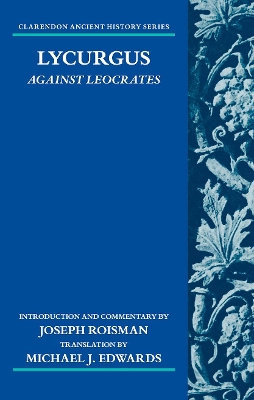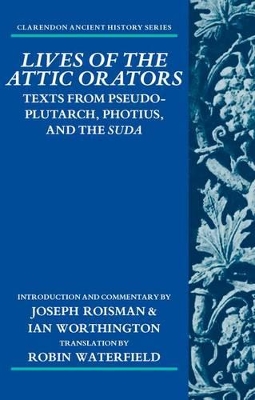Clarendon Ancient History
2 total works
This volume provides readers with a new translation and up to date historical and rhetorical commentary on the only extant speech of the Athenian leader Lycurgus (390s/380s-324 BCE), one of Athens' most influential statesman and orators. His prosecutorial speech, Against Leocrates, delivered in 330 BCE, indicted his compatriot for treason, claiming that he fled Athens after the battle of Chaeronea when the city was under threat of attack by Philip II of
Macedonia, though this attack never materialized.
Although Leocrates was acquitted after the evenly split jury ultimately came down in favour of the defence, the speech is much more than a condemnation of an alleged misconduct: it provides valuable information on the historical and political events around Chaeronea and offers Lycurgus' vision of what Athens could and should do in those circumstances, in light of models which he fashioned from Athenian and other Greek mythical and historical pasts. Not only his legal and rhetorical strategies
and the merits of the case are examined here, but also what the speech tells us about his and his contemporaries' perceptions of patriotism, their religious beliefs, views of desirable citizenship, and the tensions between the individual and the state. A detailed introduction complements the new
English translation of the speech with an authoritative account of its history and manuscript tradition, as well as an overview of the trial's procedure, Lycurgus' motives for initiating it, and Leocrates' defence. It also provides a survey of Athenian democracy and judicial system in the late fourth century BCE which will be invaluable for readers new to the text, covering Lycurgus' career, his ideology and program for Athens, and what these meant to individual Athenians and democracy, while
the in-depth commentary analysing the historical, legal, and rhetorical facets of this multi-layered and unique oration will be of use to both students and advanced scholars of ancient Greek history and rhetoric.
Macedonia, though this attack never materialized.
Although Leocrates was acquitted after the evenly split jury ultimately came down in favour of the defence, the speech is much more than a condemnation of an alleged misconduct: it provides valuable information on the historical and political events around Chaeronea and offers Lycurgus' vision of what Athens could and should do in those circumstances, in light of models which he fashioned from Athenian and other Greek mythical and historical pasts. Not only his legal and rhetorical strategies
and the merits of the case are examined here, but also what the speech tells us about his and his contemporaries' perceptions of patriotism, their religious beliefs, views of desirable citizenship, and the tensions between the individual and the state. A detailed introduction complements the new
English translation of the speech with an authoritative account of its history and manuscript tradition, as well as an overview of the trial's procedure, Lycurgus' motives for initiating it, and Leocrates' defence. It also provides a survey of Athenian democracy and judicial system in the late fourth century BCE which will be invaluable for readers new to the text, covering Lycurgus' career, his ideology and program for Athens, and what these meant to individual Athenians and democracy, while
the in-depth commentary analysing the historical, legal, and rhetorical facets of this multi-layered and unique oration will be of use to both students and advanced scholars of ancient Greek history and rhetoric.
This volume provides a complete translation of, and historical and historiographical commentary on, the lives of the ten Attic orators written by Pseudo-Plutarch, Photius, and the Suda.
Assessing these works as important historical sources for the individual lives and careers of the orators whose works have survived, this systematic study explores how these literary biographies were constructed, the information they provide, and their veracity. In-depth commentary notes offer contextual information, explain references and examine individual rhetorical phrases, and a glossary of technical terms provides a quick reference guide to the more obscure oratorical and political terms.
The volume also includes a detailed introduction which discusses the evolution of Greek oratory and rhetoric; the so-called Canon of the Ten Orators; the authorship, dates, and sources of the biographies provided by Pseudo-Plutarch, Photius, and the Suda; and a brief consideration of orators whose
speeches were either falsely attributed to Demosthenes or may be referenced in the ancient lives.
Assessing these works as important historical sources for the individual lives and careers of the orators whose works have survived, this systematic study explores how these literary biographies were constructed, the information they provide, and their veracity. In-depth commentary notes offer contextual information, explain references and examine individual rhetorical phrases, and a glossary of technical terms provides a quick reference guide to the more obscure oratorical and political terms.
The volume also includes a detailed introduction which discusses the evolution of Greek oratory and rhetoric; the so-called Canon of the Ten Orators; the authorship, dates, and sources of the biographies provided by Pseudo-Plutarch, Photius, and the Suda; and a brief consideration of orators whose
speeches were either falsely attributed to Demosthenes or may be referenced in the ancient lives.

